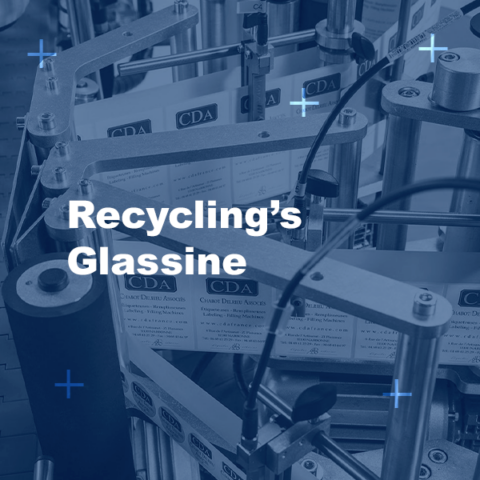What is Glassine?
Glassine is a “siliconised” paper that is smooth and resistant to grease, water, etc. It is made from unbleached wood fibres, making it translucent. Its smooth surface is ideal for a variety of applications, from food packaging to envelopes, and as a backing for roll-fed self-adhesive labels.
When companies label their production, they inevitably generate glassine waste. Managing this waste becomes a challenge for companies seeking to reduce their environmental impact while maintaining optimum production efficiency.
Glassine: A versatile material increasingly recycled by companies
Glassine is a versatile material that is gaining in popularity for a good reason: its recyclability. For several years now, the industry has been organizing itself to find recycling solutions. Today, a number of companies and associations can take charge of this “waste” and transform it into a “deposit”.
For years, the use of glassine has had harmful effects on the environment. In France, it has generated almost 50,000 tonnes of waste every year, much of which has ended up in landfill or incinerated, contributing to pollution and the degradation of ecosystems.
However, new advances and solutions have been found to tackle this environmental problem. The recyclability of glassine has become a priority for many companies, which can now collect it and pass it on to organizations responsible for processing it. Glassine can be transformed into paper, granules and other insulating materials for buildings.
National collectors cover the whole of France. We find, for example,
- AD Circular,
- Soprema,
- Upm Raflatac,
- Cycle 4 Green,
- Les Valoristes Bourguignons,
- Les Recyclades,
- Replace Plastics,
- Groupe Elise, a company with which CDA works to recycle its plastic and paper.
Advantages of Glassine Recyclability for Companies
Recycling glassine offers a number of advantages, including :
- Waste reduction: By opting to recycle their glassine, companies can considerably reduce their waste production, which helps to preserve the environment and combat pollution.
- Compliance with environmental standards: In a regulatory context increasingly focused on protecting the environment, recycling materials enables companies to comply with current environmental standards.
- Eco-responsible brand image: More and more consumers are looking to support brands that adopt sustainable practices. By recycling glassine, companies can reinforce their eco-responsible brand image and attract customers who are increasingly concerned about the environment.
An ecological partnership with SOPREMA
All our labelling machines are set up with our customers’ labels and products before shipment. These settings result in the production of a significant quantity of width/glassine without their labels. Faced with this situation, we decided to find solutions to recycle this waste.
CDA took the initiative of working with SOPREMA to recycle the glassine generated during the setting phase of its labelling machines. This collaboration represents an important step in our quest for a more sustainable approach to our daily activities.
CDA stores the glassine in 500 litre bins for collection by SOPREMA. Once collected, the glassine undergoes a sorting process to ensure that only the raw material is used for recycling. This sorting process removes any remaining labels from the glassine.
Next, the processing stages begin: the glassine is cleaned, free of impurities and unwanted waste.
SOPREMA then uses technologies to transform this recycled glassine into new raw materials, ready to be reintroduced into the production cycle. Thanks to this process, the company is helping to reduce dependence on virgin resources and limit the environmental impact associated with the production of new materials.
You too can help protect the environment by recycling your glassine! It’s quick and easy! All you have to do is get in touch with the collecting organizations closest to your company!










